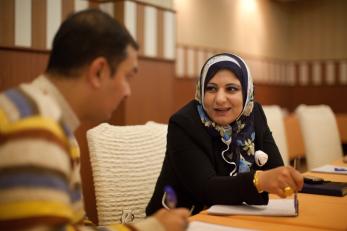Investing in Iraq’s Peace: How Good Governance Can Diminish Support for Violent Extremism

According to new Mercy Corps research, the success of armed groups in Iraq — such as the Islamic State (ISIS) — is rooted less in deep-seated sectarianism than in poor governance. Where the government is perceived to be unjust, support for non-state armed actors among marginalized groups is high. But support for groups like ISIS can shift quickly and dramatically when public perceptions of government institutions and services improve.
Forging a just, peaceful future for Iraq will require a comprehensive good governance approach.
Building on a series of nationwide public opinion surveys between 2013 and 2015, and in-depth interviews with Iraqi citizens, youth, internally displaced persons (IDPs), civil society leaders, government officials, and activists, this report finds that improving governance in Iraq will require new partnerships with civil society. The timing has never been better: civil society is gaining acceptance in Iraq and is increasingly seen as bridging the gap between citizens and government.
But the clock is ticking. The rise of sectarian militias will likely present new challenges to the future of a cohesive state. Donor support for civil society and good governance in Iraq is waning. Meanwhile, popular goodwill toward the current government may diminish if meaningful reforms are not implemented. In popular demonstrations throughout the country, thousands of Iraqi youth have, in recent months, peacefully advocated for an end to sectarianism and corruption. Iraq must capitalize on this energy, or it risks antagonizing a new generation.
Key findings
- Poor governance that results in injustice, real or perceived, is a key driver of conflict: Iraq’s instability is rooted in poor governance, not in ancient group rivalries. When marginalized groups begin to believe the government is going to be more responsive and fair, support for armed violence decreases.
- While sectarianism is often incorrectly credited for being the main source of conflict, it is nonetheless a threat to future stability: As the violent conflict continues or escalates, sectarian divisions have the potential to increase as political opportunists — both domestic and foreign — stoke tensions to gain power.
- Civil society is vital to improving governance and advancing reconciliation: Though civil society is playing a critical role in bridging the gap between citizens and government, the key question is whether, in the face of rising expectations and frustrations, it can direct new energies into nonviolent change.
- Iraqi youth, too often side-lined, are of vital importance to governance and civil society efforts: Iraq’s political, social and economic future hinges on its youth. Building a peaceful future for Iraq will require empowering the country’s youth and positively channeling their energies.
Recommendations
- Build a stronger cooperative relationship between civil society and government on key policy issues by formalizing relations with civil society actors and encouraging donors to commit multi-year investments in Iraqi civil society.
- Improve the capacity of local actors to play an active role in good governance by engaging civil society partners more deeply in informing programs, and facilitating stronger relationships between youth activities and civil society.
- Avert further conflict by ensuring governance investments are long-term and informed by local feedback, strengthening Iraq’s Reconciliation Committee, and continuing to improve government responsiveness and accountability.

